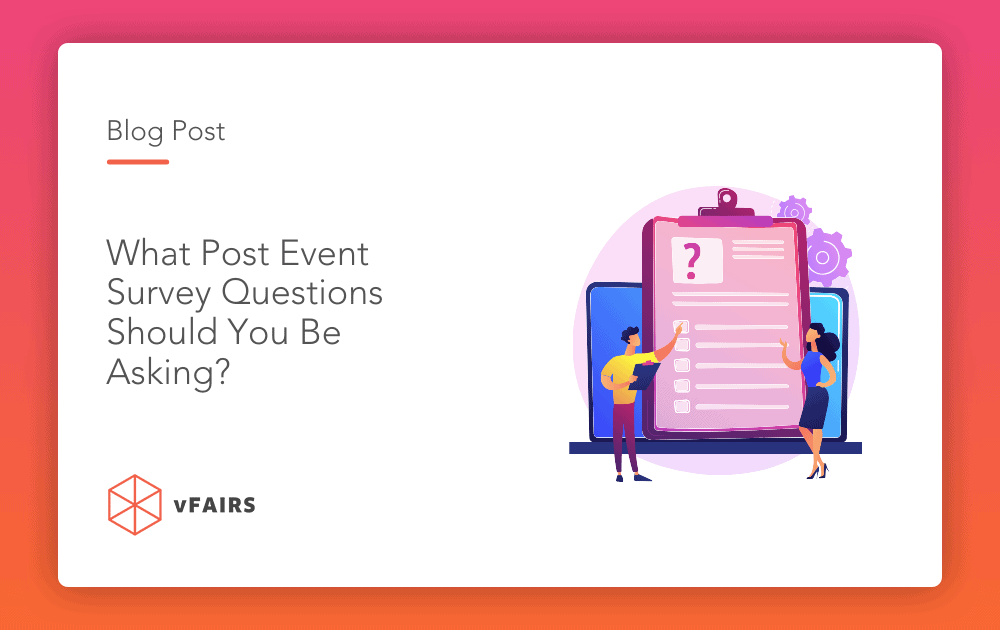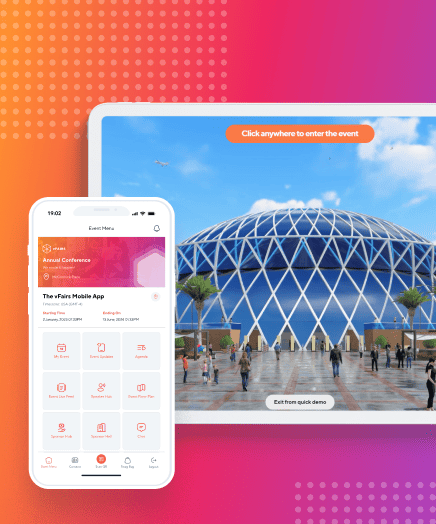A key edge that virtual events have over in-person events is the ability to extract high-quality engagement data and optimize future events for even better results.
In this pursuit, post event survey questions are a great way to understand how your attendees interacted with your virtual event what worked and what didn’t.
Since attendees are already using their digital machines to attend your event, they’re more likely to open post-event emails with post event survey questions if you send them promptly. And you can always take steps to improve your survey response rate.
Why would you ask post event survey questions?
Before you delve into developing a post event survey with post event survey questions, you need to be clear about why you’re doing it in the first place. Mainly, it’s to improve the quality of your events and improve event ROI in the future. Here are the kinds of data you can extract:
- Quantitative attendee experience data; for example, a lot of people interacted with the games and took an interest in the giveaway, so your incentives were targeted well.
- Qualitative attendee experience data, for example, highlights that a particular webinar didn’t attract a lot of attendance as it was scheduled at an inconvenient time.
Types of post event survey questions
Post event surveys are typically sent via email. Here are the question types that you can ask and when’s the best time to use them.
- NPS: The Net Promoter Score is a score between 0 and 10, often used to measure customer satisfaction. It’s calculated by finding out how many promoters you have compared to your detractors. A promoter will be a user that rates you between 9 and 10, while a detractor will be a user that rates you between 0 and 6. Here’s how it’s calculated:
 You can ask attendees how much they enjoyed the keynote session or how likely they are to recommend the event to a friend.
You can ask attendees how much they enjoyed the keynote session or how likely they are to recommend the event to a friend. - Rating scale: Similar to the NPS, the rating scale is a question type that lets you rate your agreeability with a statement. You can also create a rating scale matrix that helps respondents quickly rate different features of your event.
- MCQs: The multiple-choice question type helps increase data consistency and makes analysis easier. Add an ‘other(please specify)’ option if you fear you might have missed something.
- Yes/No: This question type can be used as a qualifier for your questions. Adding a third ‘Not sure’ response will also help you remove noise from your data.
- Open-ended: This question type helps reveal personalized data and improves survey quality. However, analyzing data for open-ended questions is tedious and requires time.
While this is a great window of opportunity, it’s important to make the most of it by asking the right questions. Each question costs your attendees time, so it needs to be purposeful.
Post event survey questions to ask
1. Yes/No: Did you attend the event?
While you might already have this data from your virtual event platform’s reports, asking this to your sign-ups helps put their experience in context. You can filter out users who signed up for the event but didn’t attend it, and then ask them questions relevant for non-attendees. Why didn’t you come? Was it at an inconvenient time, or did you forget? This will help you improve attendance for future events.
For sign-ups that did attend, you can take them to the detailed survey where they’ll tell you more about their experience.
2. MCQ: Why didn’t you attend the event?
Here’s where a ‘No’ to the previous question should take your respondents.
If people registered for an event, why didn’t they attend it? Perhaps it was because the time clashed with their schedule, or they forgot about it. These insights will help you optimize future events, like extending the duration of the event or increasing the number of reminder emails that you send out.
3. MCQ/Open-ended: What was the goal of attending this event for you?
This is important to understand so future events can be centered around popular goals. To make your data analysis easier, set this question as an MCQ with an ‘Other (please specify)’ option and allow respondents to select as many options as they like.
If you’re looking for more qualitative answers, set this up as an open-ended question.
4. NPS: Did you feel the event met your goal?
Following the question “What was the goal?”, this will help gauge whether attendees were able to achieve their goal for attending the event. If the main goal for attending the event was networking with other professionals in the niche, and most attendees weren’t able to do that, then you need to work on your networking features.
5. Open-ended/MCQ: What did you like the most about the event?
Here, you’d like to learn where your efforts truly paid off. Respondents will highlight areas that were the most valuable to them so you’ll also understand what matters to them the most. If they enjoyed the speaking sessions, you could learn from that user experience to refine your other offerings as well.
6. Open-ended: What could we have improved?
This one’s just a quick way of identifying areas that need improvement.
7. Rating Scale: How did you like the speaking session(s)?
The speaking sessions often take up a significant chunk of your event budget. Be sure to evaluate whether your attendees enjoyed them, and what could’ve been better. You can follow this up with a post event survey questions such as “What did you like/dislike about the speaking sessions?”.
8. Rating scale: How easily were you able to navigate the event?
With any virtual event, navigation and ease-of-use can often make or break the experience. Since virtual events are still new for a lot of attendees, they could have trouble finding their way around your venue. Ask if this was the case so you can work on this in your future events.
9. Rating scale: How easily were you able to meet new people at the event?
Interactivity and networking are also going to be a critical part of any virtual event that you do. Attendees don’t expect virtual events to recreate the engaging conversations people can have in-person but it’s important to give them the closest possible experience of it. Then, be sure to measure whether you succeeded.
10. Rating scale: How easily were you able to ask questions and get answers?
This question will help evaluate the quality of your Q&A sessions. Were attendees easily able to ask questions? Were all of them answered?
11. Rating scale: How clear were the audio and the visuals for you?
Again, the visuals and audio are going to be critical to the success of an event that’s running on your computer. So, you’d like to know if everyone was easily able to hear the sessions and view the relevant visuals.
12. Open-ended: Tell us if you faced any technical difficulties with the event. How quickly were they resolved?
As virtual events platforms are still new, attendees struggle to benefit from them. Several variables such as the quality of audio and video, internet, software, and the user interface. You need your event to deliver a smooth user experience. If there are any lapses, technical assistance should be readily available. Or else, you won’t have any returning attendees.
13. Yes/No: Did you make any new connections at the event?
Another aspect that virtual events might lack is the ease of networking. So you really need to make sure that your platform is providing a collection of different networking options to mimic the essence of in-person events. After you’ve worked on that, it’s important to evaluate whether you were successful in pleasing your attendees.
14. Open-ended: Is there anything else you’d like to add?
This question is important for any feedback survey that you conduct. By ending your survey with an open-ended question that ask, you let respondents give you information that you didn’t ask but were valuable to their experience.
15. Open-ended: What are your favorite moments/experiences of the event?
This question should be an open-ended one. Post-event questions like these will help you gauge which experiences were the most valuable to your attendees at the event.
This will also help you understand which event activities require more attention to achieve greater audience satisfaction.
16. MCQs/Open-ended: Did you have an opportunity to ask questions or participate in the event?
Whether you have online support to guide attendees throughout the event, it is essential to note whether participants were able to ask questions or were able to get help in the event.
These post-event survey questions give you an idea of how well-managed your event was regarding audience participation.
You can leave our question for the audience to rate, or you can leave an open-ended question where the audience can share their experience in detail.
17. NPS: How likely are you to recommend this event to a friend?
Again, this question will help you figure out if your virtual event was a success, and who your biggest promoters are so you can target them more closely next time.
Conclusion
That’s it! You can always go ahead and customize this list based on your use cases but these post event survey questions offer a good place to start with an event feedback form. What’s your go-to question to ask?





